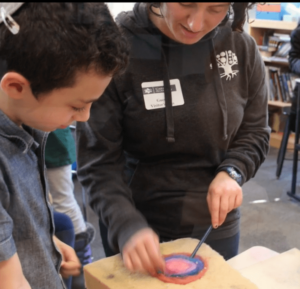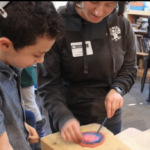by Danielle Smith, Eden Village Camp – Putnam Valley NY
In last week’s parsha, we received the ten commandments. Before we receive the golden calf, we have nearly a whole parsha of laws showing us how to apply the commandments in our daily lives. This week we receive 53 laws that talk about gender, social justice, courts, serving G-d, criminal law, ethics, and more. After Moses tells the Israelites all of these laws, they respond by saying, “we will do and listen.” These laws acknowledge the values that the ten commandments address and they give us action items for how to apply the principles of the commandments. I hope that we do not blindly follow laws just because they are written, but that we follow laws that are morally right and align with the mission of our collective society. I want to focus on two values in particular that are addressed through the laws in Mishpatim- income inequality and acts of kindness.
Mishpatim talks about female servitude and the laws around a poor father selling his daughter to a wealthier family for service and then for marriage. This portion discusses themes of Shmita, saying that after six years, a slave is free. However, a woman servant does not walk away in the same way that a man would. Instead, she can be sold for marriage to the son of the slave owner and treated with the same level of respect he would a daughter. Now, while the concept of slavery is inherently wrong and immoral, the torah is is providing an interesting perspective on how to stop the inevitable capitalist downfall of the rich getting richer and the poor getting poorer.
Rabbi Fohrman, of Aleph Beta Academy, argues that because people tend to socialize with other people from similar economic backgrounds, those with connections to good schools and jobs end up at the top, while people born into poverty get stuck with few resources and less opportunities to advance. Therefore, social and economic inequality grows and we end up with the top one percent of society holding all the wealth. In the United States, there has been a spotlight on this phenomena of income inequality. Through the laws in Mishpatim, the torah is making a claim for a new solution, one that is challenging, but vitally important to create a cohesive community. Part of the solution is to interact with people who are different from yourself and integrate people across socioeconomic boundaries. Rabbi Fohrman argues that the torah is wisely offering advice on how to break down social barriers and redistribute opportunity and privilege. The man is obligated to treat the servant woman just as he would his own daughter and provide her with all the same resources and affection. By having laws which create a society in which families from different classes interact with each other and share resources, wealth is more equally distributed and opportunities are not solely reserved for those at the top.

Danielle helps a student felt a kippah in a lesson on renewable resources and where our materials come from. Photo credit Bob Luckey Jr. / Hearst Connecticut Media
Another law that comes up in Mishpatim is a law against charging interest. The torah says that if you lend money, you cannot act as a creditor. Interest is something that starts small but overtime a person may end up buried in debt. Rori Picker Neiss, a contributor to G-dcast, explains that this law against charging interest is teaching us that if we do acts of kindness and service, we should not expect anything in return. We should do kind acts solely to help others, rather than to make ourselves feel good or to gain interest. This is actually a radical law! To act only out of kindness and not to benefit from the oppressed in any way.
At Eden Village Camp, we aim to create a space where kindness is valued highly and children are supported to express their values and wishes for the world. Some of the “laws” at camp are different than the written and unwritten laws that we follow outside of camp and others tie into themes that we see in Misphatim. For example, at Eden Village, campers and staff alike are not allowed to talk about other people’s bodies or appearances. There are also rules against bullying or talking badly about a person. By creating these rules, camp is a sanctuary for kids to learn and grow in an environment that hopefully will inspire them to take these rules and apply them to the world outside.
Eden Village campers spread kindness through New York City at the annual camp reunion in January. Check out a video here of the love parade!
Danielle is the JOFEE Fellow and Program Associate at Eden Village Camp. She teaches Jewish, environmental programs at Hebrew Schools and day schools throughout the Northeast and helps to find new campers for the summer. You can find her humming a ningun or making snow angels at Eden Village camp!
Editor’s Note: Welcome to D’varim HaMakom: The JOFEE Fellows Blog! Most weeks throughout the year, you’ll be hearing from theJOFEE Fellows: reflections on their experiences, successful programs they’ve planned and implemented, gleanings from the field, and connections to the weekly Torah portion and what they’ve learned from their experiences with place in their host communities for the year. Views expressed are the author’s and do not necessarily represent Hazon. Be sure to check back weekly!
